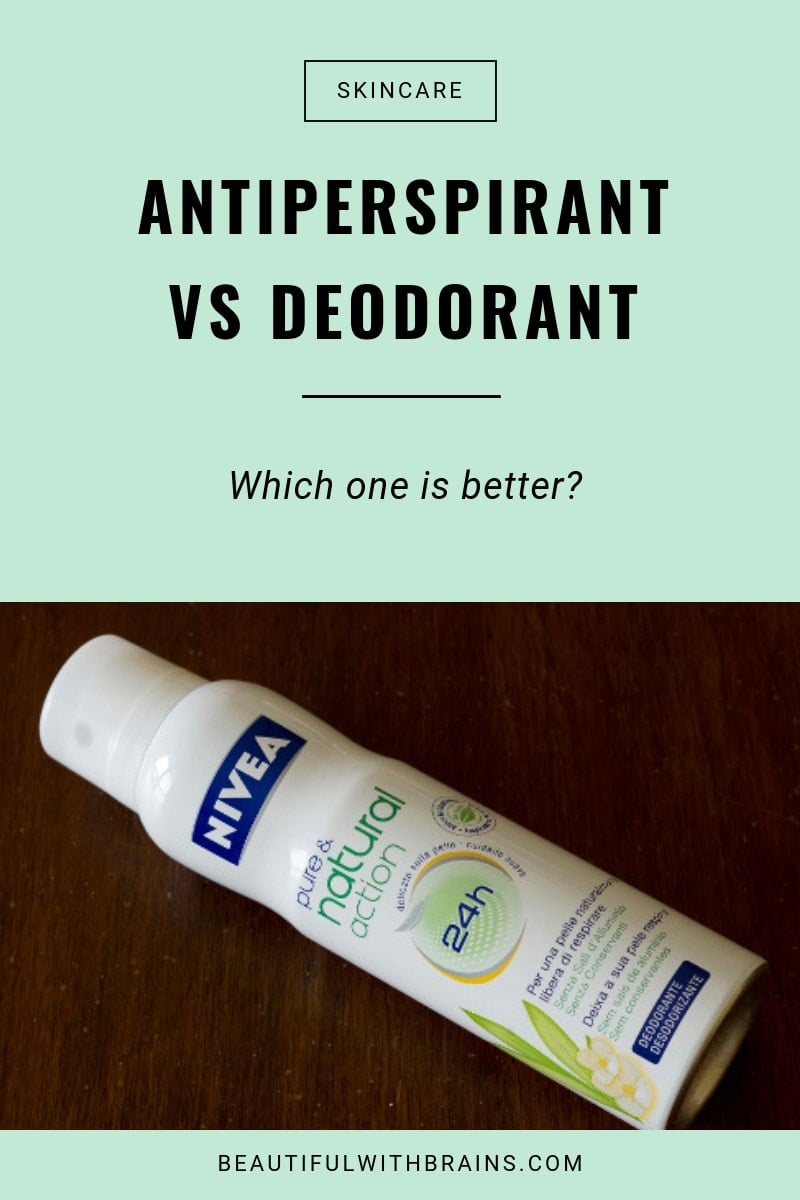Did you know there’s a difference between deodorants and antiperspirants?
Until a few years ago, I thought they were the same thing. Duh! Hey, in my defence, they’re both supposed to make you smell nice. But, as it turns out, they work in two very different ways:
What Are Antiperspirants?
WHAT THEY DO:
They stop the body from sweating, reducing underarm wetness and keeping you dry throughout the day.
HOW THEY DO IT:
Antiperspirants use active ingredients called aluminium salts, typically aluminium chloride, aluminium chlorohydrate, or aluminium zirconium compounds. These salts dissolve into the skin and temporarily block the sweat ducts, preventing sweat from reaching the surface. No sweat = no wetness = no body odour (since bacteria thrive in moisture!).
HOW LONG DO THEY LAST?
Most antiperspirants offer protection for 24 to 48 hours, depending on the formulation and your body chemistry. Some clinical-strength antiperspirants can last even longer, offering extended protection against excessive sweating (hyperhidrosis).
SIDE EFFECTS:
Some people worry that blocking sweat is harmful. But here’s the deal: you’re only applying antiperspirant to a tiny portion of your body (your underarms), so the rest of your body is still sweating as usual. Your sweat glands continue functioning normally; they just redirect sweat to other areas of the skin where it evaporates naturally. No harm done!
Said that, some people do experience skin irritation from certain formulas, particularly when they include alcohol or strong aluminium compounds. If you have sensitive skin, look for “alcohol-free” or “gentle formula” antiperspirants.
IS ALUMINIUM IN ANTIPERSPIRANTS DANGEROUS?
Word on the street is that aluminium in antiperspirants might cause health issues like breast cancer or Alzheimer’s disease. At the moment, I couldn’t find any scientific evidence supporting these claims. Major health organizations, including the American Cancer Society and Alzheimer’s Association, state there is no conclusive link between aluminium in antiperspirants and these diseases. So, if you’ve been avoiding antiperspirants for this reason, you can breathe easy!
WHO SHOULD USE ANTIPERSPIRANTS?
If you sweat a lot, experience excessive underarm wetness, or feel uncomfortable because of sweat stains, an antiperspirant is your best bet. It keeps you dry, boosts confidence, and eliminates sweat-related odours.
What Are Deodorants?
WHAT THEY DO:
Deodorants don’t stop you from sweating. They simply reduce or mask underarm odour.
HOW THEY DO IT:
Sweat itself doesn’t smell. It’s actually odourless when it leaves the sweat glands. The problem starts when sweat mixes with the bacteria on your skin, creating the dreaded BO (body odour).
Deodorants contain antiseptic ingredients like triclosan or ethanol, which reduce the bacteria that cause odour. Some deodorants also include fragrances to mask any lingering smell, so even if you do sweat, you smell fresh!
HOW LONG DO THEY LAST?
Deodorants typically last 8 to 24 hours, depending on the formulation. Natural deodorants (which don’t contain strong antibacterial agents) may need reapplication throughout the day.
SIDE EFFECTS:
Not really, unless you are allergic to something in the formula. This applies to antiperspirants, too, by the way.
WHO SHOULD USE DEODORANTS?
If your main concern is smelling fresh rather than reducing sweat, deodorants are the way to go. They let your body sweat naturally while keeping odour at bay.
Antiperspirants VS Deodorants: Which One Should I Choose?
Choosing between antiperspirants and deodorants depends on your body and lifestyle. Here’s a quick guide:
- If you sweat excessively and want to stay dry: Antiperspirants are your best friend.
- If you don’t sweat much but want to smell fresh: A deodorant will do the job.
- If you have sensitive skin: Look for fragrance-free, alcohol-free, or natural options.
- If you want an all-day solution: Antiperspirants tend to last longer than deodorants.
- If you prefer a more natural approach: Many brands now offer aluminium-free deodorants with natural antibacterial ingredients like baking soda, activated charcoal, and essential oils.
Can You Use Both?
Yes! Many people use a combination of both deodorant and antiperspirant for maximum protection.
- Apply antiperspirant at night (it works better on dry skin while you sleep).
- Use deodorant in the morning for an extra freshness boost.
What About Natural Deodorants?
Thinking about ditching aluminium? Natural deodorants might be your thing. They swap out the heavy-duty stuff for baking soda, coconut oil, zinc, and essential oils to keep you smelling fresh. But heads up—they don’t stop the sweat, so you might need a midday top-up.
Do natural deodorants actually work? For some people, absolutely! But if you’re coming off an antiperspirant, your pits might need a little time to adjust—meaning, yep, more sweat at first. Some folks swear by natural options, while others find they still end up a little funky and go back to regular deodorants or antiperspirants. It’s all about finding what works for you!
The Bottom Line
At the end of the day, it all comes down to what bugs you more—sweat or smell. If you’re tired of pit stains, grab an antiperspirant. If you just wanna smell fresh without messing with your body’s natural cooling system, a deodorant’s got your back. Or hey, why not both? Whatever keeps you feeling (and smelling) like your best self!



There are very few deodorants available for women. I usually end up buying one from the men’s section of the pharmacy.
Mary, that’s a shame. There are quite a few here, although most of them don’t work too well based on my experience. I don’t think men’s deodorants are all that different from women’s though. The main different is probably the more masculine packaging.